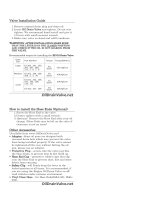
00-1 Precautions:
Precauti ons
Precautions
Precautions
Warning / Caution / Note
B838H20000001
Please read this manual and follow its instructions
carefully. To emphasize special information, the symbol
and the words WARNING, CAUTION and NOTE have
special meanings. Pay special attention to the messages
highlighted by these signal words.
WARNING
!
Indicates a potential hazard that could result
in death or injury.
CAUTION
!
Indicates a potential hazard that could result
in motorcycle damage.
NOTE
Indicates special information to make
maintenance easier or instructions clearer.
Please note, however, that the warnings and cautions
contained in this manual cannot possibly cover all
potential hazards relating to the servicing, or lack of
servicing, of the motorcycle. In addition to the
WARNINGS and CAUTIONS stated, you must use good
judgement and basic mechanical safety principles. If you
are unsure about how to perform a particular service
operation, ask a more experienced mechanic for advice.
General Precautions
B838H20000002
WARNING
!
• Proper service and repair procedures are
important for the safety of the service
mechanic and the safety and reliability of
the motorcycle.
• When 2 or more persons work together,
pay attention to the safety of each other.
• When it is necessary to run the engine
indoors, make sure that exhaust gas is
forced outdoors.
• When working with toxic or flammable
materials, make sure that the area you
work in is well ventilated and that you
follow all of the material manufacturer’s
instructions.
• Never use gasoline as cleaning solvent.
• To avoid getting burned, do not touch the
engine, engine oil, radiator and exhaust
system until they have cooled.
• After servicing the fuel, oil, water, exhaust
or brake systems, check all lines and
fittings related to the system for leaks.
CAUTION
!
• If parts replacement is necessary, replace
the parts with Suzuki Genuine Parts or
their equivalent.
• When removing parts that are to be reused,
keep them arranged in an orderly manner
so that they may be reinstalled in the
proper order and orientation.
• Be sure to use special tools when
instructed.
• Make sure that all parts used in
reassembly are clean. Lubricate them
when specified.
• Use the specified lubricant, bond or
sealant.
• When removing the battery, disconnect the
negative (–) cable first and then the
positive (+) cable.
• When reconnecting the battery, connect
the positive (+) cable first and then the
negative (–) cable, and replace the terminal
cover on the positive (+) terminal.
• When performing service to electrical
parts, if the service procedures do not
require use of battery power, disconnect
the negative (–) cable the battery.
• When tightening the cylinder head or case
bolts and nuts, tighten the larger sizes
first. Always tighten the bolts and nuts
diagonally from the inside toward outside
and to the specified tightening torque.
• Whenever you remove oil seals, gaskets,
packing, O-rings, locking washers, self-
locking nuts, cotter pins, circlips and
certain other parts as specified, be sure to
replace them with new ones. Also, before
installing these new parts, be sure to
remove any left over material from the
mating surfaces.




















